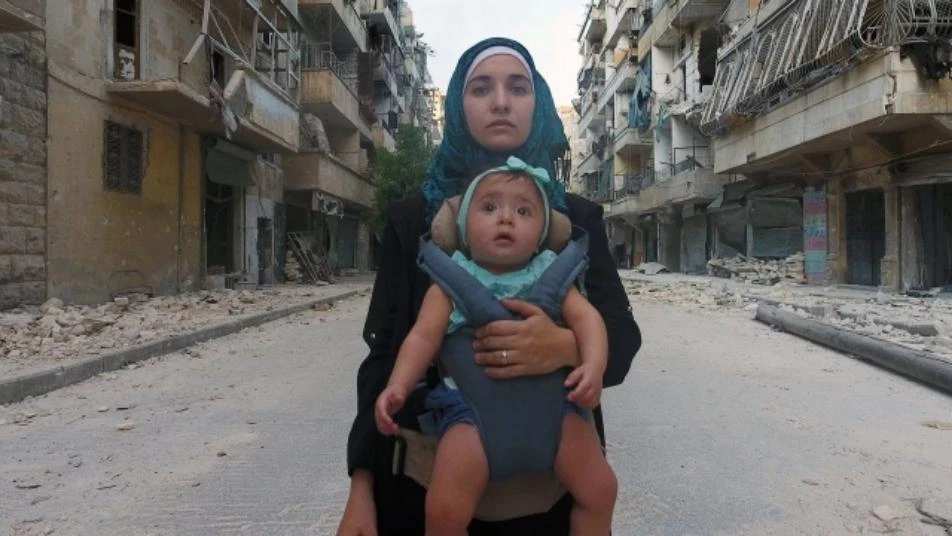For five years Waad Al-Kateab, Sama’s mother, filmed her experience of the war in Syria, a conflict which has claimed 500,000 lives and displaced millions more. Protests against the Assad regime began in 2011 and by 2012 opposition forces had seized parts of Syria’s largest city. Ms Al-Kateab was 18 years old at the time, studying economics at Aleppo University. The regime denied that the protests were happening and she felt a duty to record the revolution, working as a citizen journalist for Channel 4, a British broadcaster. She would weave through demonstrations and film Assad militiamen beating up civilians, shouting “Look! Look! Don’t tell me you can’t see them!”
“I thought I would be killed,” she says, yet “the footage would be evidence of what it looked like in Aleppo during the war.” She survived but after six months under siege, and on the advice of the United Nations, she fled the country with her family in December 2016. After arriving in Britain, Ms Al-Kateab met Edward Watts, a film-maker, and they decided to collaborate on a film. Mr Watts describes it as being a “gift from the gods”: “This was the film that I’d dreamt of making, and here it was with this incredible woman and this incredible story.”
They edited Ms Al-Kateab’s footage down from 300 hours to 95 minutes, and what remains is “For Sama”, a grim portrait of the brutality of the Assad regime. Mangled corpses lie on the ground. People choke on chlorine gas. Children’s faces—bloody and studded with shrapnel—look down Ms Al-Kateab’s lens. Two young boys watch as doctors search in vain for their brother’s pulse: the four-year-old had been playing in the street outside his home when an airstrike hit. The brothers kiss him goodbye, tears streaming down their dusty cheeks, and their mother carries him out of the hospital in a body bag. Ms Al-Kateab imagines herself as a grieving mother. In a voiceover, softly spoken in Arabic, she asks: “Sama, will you remember Aleppo? Will you blame me for staying here? Or blame me for leaving?”

The film shows Hamza’s hospital—eventually the only hospital left in Aleppo—being bombed and forced to relocate to another building. Over 20 days the doctors there perform 890 operations and receive more than 6,000 wounded. The floor is always covered in blood. Ms Al-Kateab says that when she closes her eyes she sees nothing but red.
There are moments of fleeting happiness, even in a warzone. Ms Al-Kateab’s wedding to Hamza is a low-key affair, with balloons, confetti and singing and dancing that drowns out the sound of explosions. The birth of Sama in 2016 is a joyous event, if tinged with sadness for the friends they have lost. There is evidence of human resilience, too. Old men sit and play chess amongst the rubble while children play in the burnt-out shell of a bus. Schools carry on teaching in their basements. A boy says he wants to become an architect, “so I can rebuild Aleppo”.
The film won Best Documentary at the Cannes Film Festival and has been screened at the United Nations for the Security Council as evidence of the atrocities committed by the Assad regime against the Syrian people. The film-makers would like “For Sama” to be shown to the Russian government. “The Russians are the ones who have kept the regime alive,” Mr Watts says. “This film is like an empathy machine: it allows people to experience what’s happened in Syria through Waad’s eyes and maybe that can even touch the cold heart of Vladimir Putin.”
Today, Ms Al-Kateab lives in London with her family. Sama, now three years old, has been joined by a little sister, Taima, aged two. Will they ever return to their home country? “When things are different on the ground, and the regime is out of power, we will all die to be back.” But the war is not over, Ms Al-Kateab laments: the regime continues to bomb Idlib, the last rebel stronghold.
But Sama brings hope, and that is why the film is dedicated to her. “Sama” means sky in Arabic; Ms Al-Kateab says that it represents the sky they long for, one with no warplanes, just sun, clouds and birds. “For Sama” is a love letter, not just from mother to daughter, but to Aleppo and its people.
“For Sama” is released in select cinemas on September 13th. It will be screened on Channel 4 in the autumn
Link to the original source of The Economist



التعليقات (0)